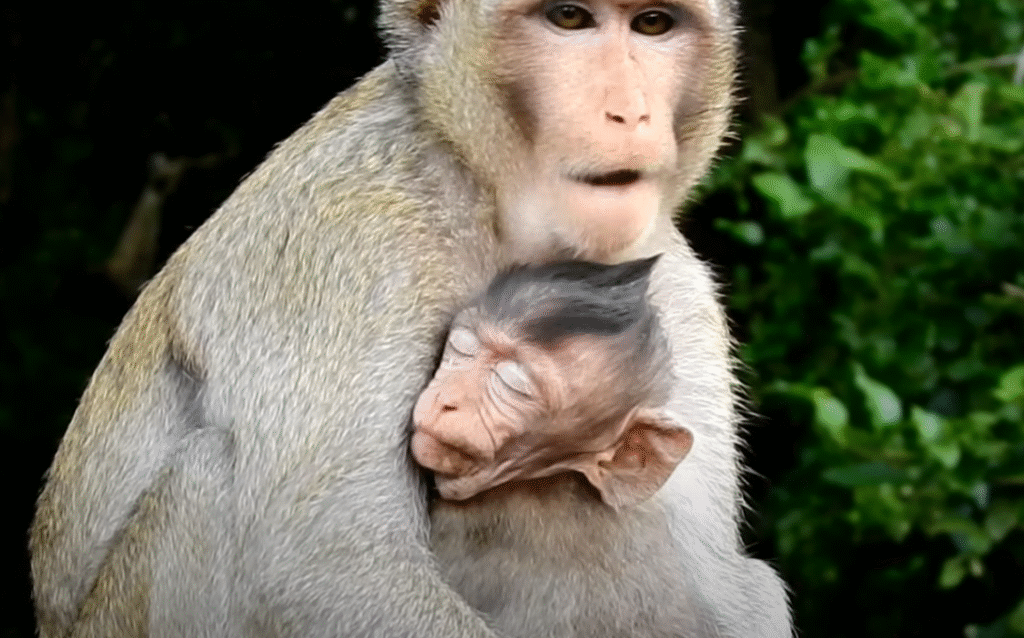Deep in the heart of Angkor Wat’s lush, ancient forest, where temple ruins are slowly being reclaimed by nature, a sound broke the silence—high-pitched, sharp, and unmistakable.
It was the cry of a baby monkey.
It was Lizza.
The morning had started peacefully. Lizza had been foraging near the edge of the troop’s territory, her curious little hands turning over leaves and bugs, eyes wide at the world. She was still just a baby, full of wonder and innocence. But that same innocence left her unaware of the danger creeping closer—a rogue adult male, huge, scarred, and unpredictable.

Without warning, the male charged. He was aggressive, territorial, and had no patience for small ones who wandered too far. In an instant, he pinned Lizza to the ground, biting her shoulder, clawing at her back.
Her screams rang out like an alarm bell. I was there, just 30 feet away, documenting the troop as I often do. The sound made my heart stop. Through my lens, I saw the others scatter. No one dared to intervene.
Not even Lizza’s mother.
Anna—Lizza’s mom—had always been somewhat timid. A gentle spirit, yes, but not the kind to challenge the dominance hierarchy. When the male attacked her baby, she froze in the distance. Her eyes darted, filled with fear, but her body wouldn’t move. The instinct to protect was there… but fear won.
Then came CaCa.
She wasn’t related by blood. CaCa was a teenage monkey—bold, clever, and often misunderstood by the older females. But what she did next left every monkey, and every human watching, speechless.
CaCa ran straight into danger.
Without hesitation, she jumped onto the male’s back. She screeched, slapped, and even bit him on the ear. Her small frame looked impossibly tiny compared to his, but she didn’t care. She kept fighting, buying seconds—precious seconds—for Lizza to escape.
And escape she did. Lizza scrambled out from under the attacker, blood running down her side, one arm limp. She limped behind a bush, weak and trembling. The male turned, snarling at CaCa.
I held my breath.
But CaCa didn’t back down. She stood between him and Lizza, chest puffed, eyes blazing. Her body shook—but her will didn’t. The male paused, then turned and stomped off, his pride wounded by a girl half his size.
Silence returned to the forest.
CaCa immediately ran to Lizza. What happened next made everyone who watched burst into tears—myself included. She gently held Lizza, checked her wound, and began grooming her fur. Tiny chirps passed between them—comforting sounds, like a lullaby.
Still, no sign of Anna.
As humans, we often place expectations on animal behavior—especially mothers. But sometimes nature surprises us. In this story, it wasn’t the biological bond that saved the day. It was love born of loyalty, friendship, and the kind of fierce, instinctive protection that only real connection brings.
That day, CaCa became more than just a monkey in the troop. She became a hero.
She didn’t do it for dominance. She didn’t do it for approval. She did it because something inside her said, “No. I won’t let this happen.”
In the hours that followed, I watched as CaCa continued to care for Lizza. She shared her food, stayed close, and even slept curled around the little one. Eventually, Anna came closer—but she never took Lizza back in fully that day. It was CaCa who stood by her through the pain.
Sometimes, family isn’t about who gives birth to you.
It’s about who shows up when no one else will.
And that’s the real heart of this story.
I left the forest that evening with more than just footage. I left with a deeper understanding of how powerful emotional bonds can be—even in the wild. And I knew I had to share this with the world. Because if a teenage monkey can risk everything for someone who needed her, what excuse do we have not to be brave for the ones we love?
This isn’t just a story about monkeys.
It’s a story about love, courage, and the kind of friendship that defies fear.